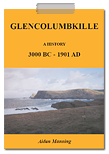For the next century and a quarter, large groups of poitin makers used the mountains, the many islands, the plentiful streams and abundant peat to supply most of whiskey consumed in County Donegal and such neighbouring towns as Strabane and Derry. The revenue department exacerbated the problem by further restrictive legislation and by requiring that the few remaining legal distillers manufacture a hurried, ill-tasting, raw-corn-based spirit that contrasted starkly with the mellow, barley-malt-based poitin.
Over the years, the government used revenue officers, soldiers, local thugs, militia, yeomanry, coastguard, and finally the revenue police in futile attempts to put down Donegal poitin making. Scores of people were killed and hundreds injured in clashes that grew more violent as the decades passed and illicit spirits flowed as freely as ever. This book details that brutal period in Donegal history.












